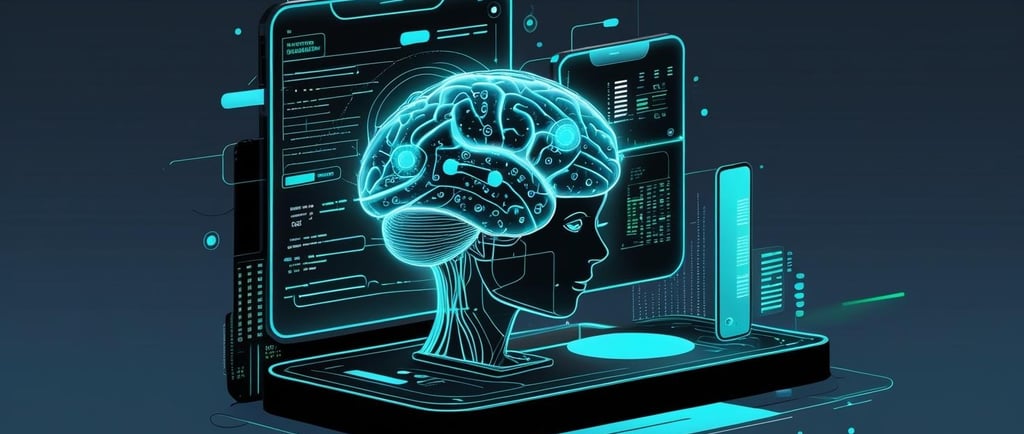What is AI? A Beginner’s Guide to What It Can Actually Do
8/4/20255 min read



Understanding Artificial Intelligence: A Simple Explanation
Artificial Intelligence (AI) is a branch of computer science dedicated to creating systems that can perform tasks typically requiring human intelligence. These tasks can range from problem-solving and learning to understanding natural language and recognizing patterns. Unlike traditional programming, where explicit instructions are provided to the system to execute tasks, AI systems are designed to learn from data. This leads to a more adaptable approach, enabling the technology to improve its performance over time without the need for constant human intervention.
AI can be broadly categorized into two main types: narrow AI and general AI. Narrow AI, also referred to as weak AI, is designed for specific tasks, such as facial recognition or language translation. These applications perform very well within a defined scope but lack the ability to generalize their knowledge beyond their programmed tasks. On the other hand, general AI, often termed strong AI, aims to replicate human cognitive abilities across a wide range of functions. Although strong AI remains largely theoretical, it represents the ultimate goal of AI research: to create machines that can think and reason like a human.
At its core, the overarching goal of AI is to mimic human intelligence, allowing machines to perform cognitive functions such as learning, reasoning, and self-correction. This capability has significant implications in various sectors, from healthcare and finance to entertainment and transportation, providing innovative solutions and enhancing efficiency. Overall, AI's potential to revolutionize industries and improve everyday life underscores its growing significance in the modern digital landscape. By fostering an understanding of AI fundamentals, individuals can better appreciate its impact and future possibilities.
Key Capabilities of AI Today
Artificial Intelligence (AI) has made significant strides in recent years, showcasing a wide array of capabilities that have transformed various aspects of both personal and professional life. One of the most notable functions of AI is automation. By enabling machines to perform repetitive tasks, AI frees up human workers to focus on more complex and creative aspects of their jobs. For example, manufacturing operations often rely on AI to streamline processes, resulting in increased efficiency and reduced costs.
Another critical capability of AI is data analysis. AI systems can process vast amounts of data at remarkable speeds, identifying patterns and trends that might elude human analysts. This capability is especially indispensable in sectors such as finance, where algorithms predict market trends, and healthcare, where AI analyzes patient data to improve outcomes. Machine learning models continuously evolve by learning from new data, making them increasingly accurate over time.
Further, content generation has emerged as a fascinating application of AI. Creative AI tools can draft articles, compose music, or generate artwork based on specified criteria. These innovative technologies serve various industries, assisting marketers in creating targeted content and enabling writers to overcome creative blocks.
In the realm of customer service, chatbots are an excellent representation of AI's capabilities. These intelligent systems engage with customers, answering queries and providing support around the clock. Coupling chatbots with natural language processing enhances their ability to understand and respond effectively to user inquiries.
Personal assistants like Siri and Alexa exemplify how AI can simplify everyday tasks. They assist users in managing schedules, controlling smart home devices, and retrieving information swiftly. Additionally, personalized recommendations, such as those provided by streaming services or e-commerce platforms, leverage AI to suggest products or content tailored to individual preferences.
Collectively, these capabilities illustrate AI's transformative potential across various domains, proving its value in enhancing productivity and enriching user experiences in meaningful ways.
Real-World Examples of AI in Action
Artificial Intelligence is increasingly becoming a significant part of various sectors, showcasing remarkable applications that enhance both personal and professional environments. In the healthcare industry, AI-driven technologies assist in diagnosis and treatment planning by analyzing vast amounts of medical data. For instance, algorithms can identify patterns in medical imaging, facilitating the early detection of diseases such as cancer. Virtual health assistants, powered by AI, also provide personalized patient interactions, enabling timely responses to basic medical inquiries and thus allowing healthcare professionals to focus on more complex cases.
In the finance sector, AI is utilized for risk assessment and fraud detection. Machine learning algorithms analyze transaction data in real-time to flag unusual activities, helping organizations mitigate financial fraud effectively. Automated trading systems also leverage AI capabilities to make informed decisions based on market trends, potentially increasing profitability. These applications illustrate how AI transforms financial processes by improving both speed and accuracy, leading to more informed decision-making.
Marketing is another field where AI plays a vital role, particularly in customer segmentation and personalized advertising. By analyzing consumer behavior data, AI systems can predict customer preferences, enabling marketers to tailor campaigns that resonate with specific audiences. Furthermore, chatbots powered by AI enhance customer service by providing instant responses and support, thereby improving customer satisfaction. These interactive systems streamline communication and assist in resolving issues without extensive human intervention, resulting in a more efficient customer experience.
In summary, real-world applications of AI span numerous industries, demonstrating its ability to enhance productivity, streamline processes, and improve customer experiences. By incorporating AI technologies, organizations can leverage insights and capabilities that lead to better decision-making and innovation, ultimately highlighting the tangible benefits that AI brings to everyday life.
Harnessing AI for Personal Growth and Income Generation
Artificial Intelligence (AI) has emerged as a transformative tool that individuals can leverage to enhance productivity, streamline operations, and explore new income opportunities. By adopting various AI technologies, users can significantly improve their daily efficiency, allowing them to dedicate more time to personal growth and creative pursuits.
One of the primary advantages of AI is its capability to assist with writing tasks. Tools powered by AI can enhance writing speed, generate creative ideas, and even provide grammar suggestions, allowing users to produce polished content effortlessly. Whether for blogging, academic writing, or professional communication, these AI writing assistants can be invaluable, particularly for freelancers who need to generate content rapidly and maintain high standards of quality.
In addition to writing, AI can profoundly impact scheduling and time management. Calendar and scheduling applications that utilize AI algorithms can analyze a user's routines and preferences, consequently optimizing appointment setting and task prioritization. This automation allows individuals to focus on activities that contribute to their personal growth without getting bogged down by administrative tasks.
Data management is another area where AI can significantly enhance productivity. Tools that analyze and interpret data sets can provide valuable insights, making it easier for individuals to understand trends or results that can inform their decisions. This capability is especially beneficial for small business owners who need to track customer preferences, sales trends, and operational efficiency.
For freelancers and small businesses alike, integrating AI technologies can lead to streamlined operations and enhanced efficiency, enabling them to serve clients better and, ultimately, increase their income. The practical application of AI is vast, and individuals are encouraged to explore various tools tailored to their specific needs.
To further assist with this journey into the world of AI, we invite readers to grab a free toolkit of recommended AI tools designed to accelerate personal growth and income generation. Subscribe to our newsletter for more insightful content aimed at maximizing the benefits of AI in everyday life.

